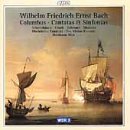| All Artists: Wilhelm Friedrich Ernst Bach, Hermann Max, Das Kleine Konzert Title: W. F. E. Bach: Columbus; Cantatas & Sinfonias Members Wishing: 0 Total Copies: 0 Label: Cpo Records Release Date: 11/14/2000 Genres: Pop, Classical Styles: Vocal Pop, Opera & Classical Vocal, Chamber Music, Historical Periods, Classical (c.1770-1830), Symphonies Number of Discs: 1 SwapaCD Credits: 1 UPC: 761203967223 |
Search - Wilhelm Friedrich Ernst Bach, Hermann Max, Das Kleine Konzert :: W. F. E. Bach: Columbus; Cantatas & Sinfonias
 | Wilhelm Friedrich Ernst Bach, Hermann Max, Das Kleine Konzert W. F. E. Bach: Columbus; Cantatas & Sinfonias Genres: Pop, Classical
|
Larger Image |
CD Details |
CD ReviewsNot your grandfather's Bach! (Not bad either) Thomas F. Bertonneau | Oswego, NY United States | 02/09/2001 (4 out of 5 stars) "In writing about poetry, the critic Harold Bloom likes to invoke what he calls the anxiety of influence. Nothing irks a poet, more, Bloom argues, than the achievement of a previous poet. A present poet experiences something like an Oedipal dilemma when he confronts the cumulus of past greatness. Does the same principle apply in music? Brahms, acutely aware of Beethoven didn't publish his First Symphony until 1876, although the sketches went back twenty years previously. On the other hand, Johann Sebastian Bach showed no reluctance in recycling concertos and other works by his elders, such as Vivaldi, with no sign whatsoever of Bloom's alleged anxiety. What about Bach's sons - and grandsons? Here the record displays ambiguity. Carl Phillip Emmanuel, Johann Christian, and Johann Christoph Friedrich seem to have been confident of their own powers and self-possessed, but Wilhelm Friedemann (J.S.'s eldest surving male offspring), who stayed closest to his father in his musical ethos, appears to have lacked a secure sense of his own talent. The final generation of musical Bachs is represented by one of the grandsons, Wilhelm Friedrich Ernst Bach (1759-1845), son of Johann Christoph Friedrich. W.F.E. Bach worked in Berlin for Wilhelm II and for Queen Elisabeth and Queen Luise. Eighteenth century specialist Max Hermann and his Rheinische Kantorei have recorded a sampler of W.F.E.'s work for CPO. If there is influence here, it comes from elsewhere than Johann Sebastian: The grandson writes in the galant style, with an awareness of Haydn and Mozart, and produces work of remarkable insouciance and charm. Max directs two symphonies and three cantatas. The Sinfonia in G and the Sinfonia in C come, astonishingly, from the 1790s. They sound like early examples of the Mannheim School, hardly more complicated than an Italian overture. The three cantatas are a celebration of Friedrich Wilhelm II's accession to the Prussian throne (1788), an "Our Father" (1791), and a commemoration of Columbus' first voyage (undated in the booklet but presumably from 1792). The music ingratiates on the first hearing, partly because of its naivety, partly because of its sincerity. Now "sincerity" sometimes implies damning with faint praise, but no condemnation is meant. All five performances are presumably "authentic." This would usually irritate me, but so felicitous is the substance that the "correct" tunings and mock-antique instrumentation do not bother me. The Mozart of "The Magic Flute" often comes to mind. There is a gentleness here that knocks down one's defenses. W.F.E. died without male issue. In 1843, he attended the dedication of the Bach Memorial in Leipzig. "Ernst" means "serious" in German. "Modest," "generous," "unassuming" are adjectives that also fit the man and his music."
|

 Track Listings (13) - Disc #1
Track Listings (13) - Disc #1